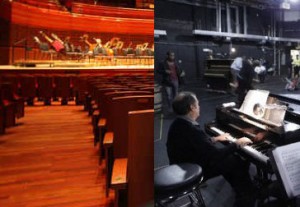
Editor’s note: The Sound Post generally avoids covering the recent downturn in arts funding as it does little to help the situation and simultaneously neglects the more important aspect of the industry—the art. But just as the headlines flow about organizations seeing red, there is a similar trickle of news about surfacing grants and endowments. So, this multi-part story will attempt to chronicle the down and up of the music industry; for now we lament the dwindling zeros, but look for updates on how everyone is not only keeping their heads above water, but climbing back into the boat.
As the cooling economy continues to do its number on the numbers of many North American arts organizations, orchestras and opera houses across the US are reevaluating their budgets in an effort to weather the dreary economic climate.
It has touched almost every music organization both in the US and internationally, including the top orchestras. The Philadelphia Orchestra has been consistently under-performing (financially), with a $7 million one-time emergency fund set to ‘bridge’ the gap in its $44 million budget. While most of that money is coming from the board, the Philly still needs to stimulate ticket sales for next year in order to avoid a similar quagmire. While the opening of Verizon hall in 2001 initially prompted more robust attendance, the orchestra has lately been seeing only 2/3 tickets sold. Hopefully the newly overhauled management and music directorship will be able to jump-start the withering income of one of America’s oldest and most revered organizations.
See a detailed explanation of their financial situation at The Philadelphia Inquirer.
Neighboring The Philadelphia Orchestra is the New Jersey State Opera, who currently owes $230k in back pay to contractors and musicians who worked on their production of “Porgy and Bess” in May. While the performance was an exciting rebirth for the company and a welcome endeavor for the city of Newark, even Newark Symphony Hall has been left wanting its fees. The company is diligently seeking to raise money so they might escape impending legal action from the National Labor Relations Board; they fear their next scheduled production might in fact become a fundraiser. One hopes that the company may find its funding and continue to revitalize opera in Newark.
Here’s the article on nj.com detailing the debacle.
While the financial future of some North American arts organizations might be uncertain, they are nonetheless the foundation of music and culture in our continent. While ticket money is now worth more than ever, the music world will certainly bounce back of its own accord, bailout or not.
"News related to the modern world of classical music."






The present doesn’t look very good. We may lose some of our struggling art institutions. Those still around when recovery starts in earnest ought to be in good shape. Meanwhile, popular conductors of the 19th-century (Musard, Jullien, Strauss, etc.) can probably teach us soething about programing concerts that appeal to a broad public. And no, it’s not neglecting the great classics. http://music.allpurposeguru.com/2010/08/building-audience-for-symphony.html
Indeed the maestri’s lessons will prove valuable in coming seasons. Ticket sales have the power to reverse the bleeding bank accounts at many of these institutions; hopefully the new, young conductors tasked with revitalizing audiences will have the acumen to choose programs capable of attracting attendees.